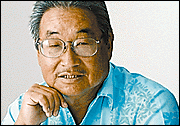Advertisement - Click to support our sponsors.


Sports Watch
NOTHING is forever. Even Les Murakami, the baseball coach who became an institution at the University of Hawaii. 2001 will be
Murakami’s swan songIt'll be once more with feeling for Murakami, who will step down after the 2001 baseball season, the Star-Bulletin has learned.
Murakami, whose contract ends June 30, will be given a one-year extension and then will resign after next season as part of a mutual agreement.
An announcement was scheduled for late this morning by UH athletic director Hugh Yoshida.
Murakami completed his 30th season as coach of the Rainbows, who posted a lack-luster 28-28 won-loss record (15-15 in the Western Athletic Conference) and failed to make the NCAA postseason playoffs for the seventh straight year.
Under Murakami, the Rainbows won six WAC championships, although their last hurrah came in 1992.
In 1980, his Rainbows finished runner-up to Arizona in their first and only appearance in the College World Series. They only had to take one of two games against the Wildcats to win the national title.
Getting back to the CWS has been an ongoing dream for Murakami. His Rainbows made eight NCAA appearances after that year, but they never made it back to the CWS again.
Then UH's baseball fortunes really went into a tailspin beginning with 1993 as the Rainbows suffered six straight losing seasons in the WAC before going 15-14 in 1999.
Fan interest and attendance also began to dwindle and the once money-making baseball program went into red figures. It's expected to lose some $360,000 this season, making the program a million-dollar financial drain on the athletic budget over the past several years.
That was accompanied by growing speculation whether Yoshida would fire Murakami or ask him to resign.
Apparently, Murakami has decided to retire after one more season. He will be 65 shortly after the 2001 season.
It should bring some closure to the troubled baseball program, which has stagnated in recent years.
ALL of the positive things he has accomplished -- building the program from scratch, building Rainbow Stadium, which Murakami lists as the No. 1 highlight of his career, winning his 1,000th game, and getting inducted into the American Baseball Coaches Association Hall of Fame -- would have been negated or forgotten if nothing had been done.
Yoshida knew he couldn't afford to let it drag on. He apparently had convinced Murakami this was the best solution under the circumstances.
A week ago when asked about the Murakami situation, Yoshida said, "We've got to do right by the man."
"His loyalty is his strength and it's also his weakness," said one source close to the UH scene. "If he only had changed some of his assistant coaches, he wouldn't have been in this situation. But he's too loyal to them."
Equally unfortunate is that none of Murakami's assistants decided to fall on their swords for him, either.
So the 2001 season will be sort of a farewell tour for Murakami. And celebratory send-off, as it were.
And it'll give all those loyal to Murakami a chance to support him in his final season as coach of the baseball 'Bows.
Here's hoping Murakami's last hurrah will be one in which the cheering never stops. Let it be once more with feeling for Murakami, who deserves to go out on his terms and with dignity.
Nothing is forever. Even an icon such as Les Murakami.